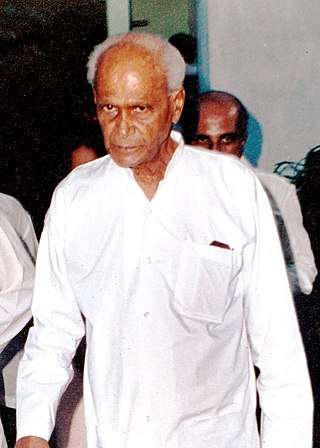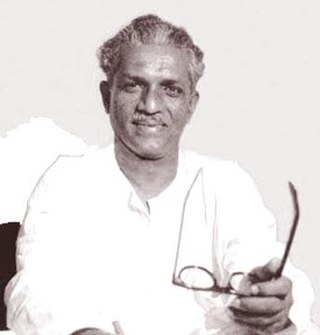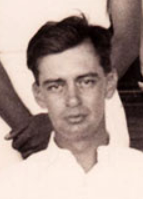
Solomon West Ridgeway Dias Bandaranaike, also known as "The Silver Bell of Asia", was a Ceylonese statesman who served as the fourth Prime Minister of the Dominion of Ceylon, serving from 1956 until his assassination. The founder of the left-wing and Sinhalese nationalist Sri Lanka Freedom Party, his tenure saw the country's first left-wing reforms.

Wijeyananda Dahanayake was a Sri Lankan politician. He was the Prime Minister of Ceylon from September 1959 to March 1960.

Sir Oliver Ernest Goonetilleke was a Sri Lankan statesman. Having served as an important figure in the gradual independence of Ceylon from Britain, he became the third Governor-General of Ceylon (1954–1962). He was the first Ceylonese individual to hold the vice-regal post.

Don Philip Rupasinghe Gunawardena was a Sri Lankan Marxist politician and leftist. A founder of the Lanka Sama Samaja Party, the first political party in Ceylon which was known for having introduced Trotskyism, he later formed the Mahajana Eksath Peramuna and was called 'the Father of Socialism' and as 'the Lion of Boralugoda'. A member of the State Council of Ceylon and the Parliament of Ceylon, he served as the Minister of Agriculture and food under S. W. R. D. Bandaranaike from 1956 to 1959 and as Minister of Industries and Fisheries in the national government under Dudley Senanayake from 1965 to 1970.

Patrick de Silva Kularatne was a Sri Lankan educationist and politician. He was a Member of the State Council of Ceylon (1942-1947) and Member of Parliament (1960-1965). He served as Principal of Ananda College and Dharmaraja College and established Nalanda College Colombo, Ananda Balika Vidyalaya, Moratuwa Vidyalaya and Dharmapala Vidyalaya. As a member of the executive committee on Education, he played an instrumental role in the realisation of free education from kindergarten to university.

Colonel Frederick Cecil "Derek" de Saram, OBE, ED was a Sri Lankan lawyer, a Ceylon cricket captain, and an officer of the Ceylon Army. He led the attempted military coup of 1962.
The 1962 Ceylonese coup d'état attempt was a failed military coup d'état planned in Ceylon. A group of Christian officers in the military and police planned to topple the government of Prime Minister Sirimavo Bandaranaike during the night of 27 January 1962. Organised by Colonel F. C. de Saram, Colonel Maurice De Mel,, Rear Admiral Royce de Mel, C.C. Dissanayake, Sydney de Zoysa and Douglas Liyanage, it was to take place in the night of 27 January 1962, but was called off as the government gained information in the afternoon and initiated arrests of the suspected coup leaders before the coup was carried out.
Cyril Cyrus "Jungle" Dissanayake, MVO was a Sri Lankan senior police officer. He was serving as Deputy Inspector-General of Police of Range I, when he was implicated as one of the leaders of the attempted military coup of 1962.

Richard Gotabhaya Senanayake was a Sri Lankan politician. He was Minister of Trade and Commerce during the period 1952-56 and 1956-60. He was elected a Member of Parliament from Dambadeniya in 1952 and in 1956 from Kelaniya, thus holding concurrent seats from two constituencies, while he retained his seat from Dambadeniya in 1960 and 1965. He was the eldest son of the freedom fighter Fredrick Richard Senanayake and was educated at the Royal College, Colombo and at Downing College, Cambridge and had become a barrister.

Stanley de Zoysa was a Sri Lankan businessmen and politician. He was the former Cabinet Minister of Finance (1956–1959) in S. W. R. D. Bandaranaike's government, subsequently Minister of Interior (1959–1960) and Ceylon's Ambassador to Indonesia.
S. A. "Jingle" Dissanayake(16 September 1913 - 11 March 1982) was a former Sri Lankan Inspector-General of Police. He played a major role as Deputy Inspector-General of Police of the Criminal Investigation Department in stopping the attempted military coup of 1962. Later in 1971 during the 1971 JVP Insurrection he was appointed as Additional Secretary of the Ministry of External Affairs and Defence and coordinated military and police operations that crushed the insurrection in two months.
Charles Percival de Silva was a Sri Lankan politician and civil servant. He had served as the Minister of Finance, Minister of Lands, Land Development and Agriculture; and Minister of Power and Irrigation, and Chairperson of the Sri Lanka Freedom Party, and later joined as a senior member of the United National Party.
Manameldura Piyadasa de Zoysa was a Ceylonese politician.

Casila Abdul Samed "Sinhala" Marikkar was a Sri Lankan politician. He served as Minister for Post, Broadcasting and Communication from 1956 until 1960 and the Minister of Cultural affairs from 1956 to 1960 in the S. W. R. D. Bandaranaike cabinet and Dahanayake cabinet, and was a member of parliament representing the Sri Lanka Freedom Party (SLFP) from Kadugannawa.
Santiago Wilson Osmund De Silva was Ceylonese police officer. He was the thirteenth and the first Ceylonese career police officer to become Inspector-General of Police (1955–1959).

Don Stanley Ernest Perera Rajapakse Senanayake was the 18th Inspector General of the Sri Lanka Police (IGP) (1970–1978). Senanayake is the second longest serving IGP, after Sir Herbert Dowbiggin, remaining in the position for seven years.

S. W. R. D. Bandaranaike, the fourth Prime Minister of Ceylon, was assassinated by the Buddhist priest Talduwe Somarama Thero on September 25, 1959, while meeting the public at his private residence, Tintagel, at Rosemead Place in Colombo. Shot in the chest, abdomen, and hand, Bandaranaike died the following day at Merchant's Ward of the Colombo General Hospital. He was the first Sri Lankan national leader to be assassinated, which led to his widow Sirimavo Bandaranaike becoming the world's first female prime minister.
Morawakkorakoralege Walter Fonseka Abeykoon was a Ceylonese civil servant and served as the Inspector General of Police between 1959 and 1963.
John Wilhelmus Lucius Attygalle (1906–1981) was the 16th Inspector General of the Sri Lanka Police (IGP) (1966–1967).
Senator Layard Jayasundera as a Ceylonese politician. He was the Minister of Local Government and Housing and the Minister for Internal Security in the cabinet of W. Dahanayake and a member of the Senate of Ceylon.









